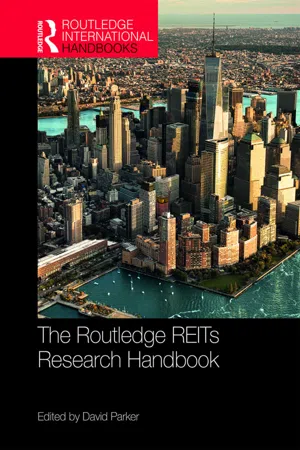
The Routledge REITs Research Handbook
David Parker, David Parker
- 306 Seiten
- English
- ePUB (handyfreundlich)
- Über iOS und Android verfügbar
The Routledge REITs Research Handbook
David Parker, David Parker
Über dieses Buch
The Routledge REITs Research Handbook presents a cutting-edge examination of the research into this key global investment vehicle. Edited by internationally respected academic and REIT expert Professor David Parker, the book will set the research agenda for years to come. The handbook is divided into two parts, the first of which provides the global context and a thematic review covering: asset allocation, performance, trading, sustainability, Islamic REITs, emerging sectors and behavioural finance. Part II presents a regional review of the issues with high level case studies from a diverse range of countries including the US, UK, Brazil, India, Australia, China, Singapore, Israel and Russia, to name just a few.
This handbook redefines existing areas within the context of international REITs research, highlights emerging areas and future trends and provides postgraduates, professionals and researchers with ideas and encouragement for future research. It is essential reading for all those interested in real estate, international investment, global finance and asset management.
Häufig gestellte Fragen
Information
Part I
International REITs
Thematic review of emerging issues
1
Critical contextual issues in international REITs
1.1 Introduction
- the impact on the REIT market and on REIT industry practice of the rapid rate of evolution of the REIT sector following the wave of legislative changes in the US in the 1980s, leading to the modern REIT era of the 1990s, followed by the global financial crisis of the 2000s leading to what has become known as the post-modern REIT era and which is considered in detail in Chapter 2;
- the growing role of specialized property market sectors as a source of assets for REITs. Where, previously, REITs focused on commercial, retail and industrial property as core assets for both diversified REITs and sector-specific REITs, this is now widening to include specialized property market sectors such as self-storage or timberland and thus potentially creating a new risk-return profile in the REIT sector, which is considered in Chapter 3;
- the role of sustainability in both the property market sector and the REIT sector has grown considerably over the last decade, with major performance implications for those physical property assets that comprise the primary investment for REITs and for REITs themselves, as considered in Chapter 4;
- the future role of Islam features prominently in both global and national politics as well as in the REIT sector, given the massive depth of investable funds available in the Islamic world and the specific investment requirements of the Islamic world, as considered in detail in Chapter 5;
- as REITs become massive global businesses, a key risk that emerges is the human risk arising from the actions or inactions of human beings as REIT managers and operatives, making the world of behavioural finance and cognitive risk increasingly relevant to REIT management, as considered in Chapter 6; and
- the perennial questions: are REITs real estate? and what place do REITs have in a mixed-asset portfolio? continue to challenge both academics and REIT experts around the world with recent research reviewed in Chapter 7.
| Chapter | Region | Developed REIT Sector | Developing REIT Sector | Emerging REIT Sector |
|---|---|---|---|---|
| 8 | North America | US | Canada | Mexico |
| 9 | Latin America | Brazil | Argentina | Uruguay |
| 10 | Europe | UK | Spain | Poland |
| 11 | South East Asia | Singapore | Malaysia | Thailand |
| 12 | North Asia | Japan | Hong Kong | China |
| 13 | Oceania | Australia | South Africa | India |
1.1.1 Defining characteristics of a REIT
European Public Real Estate Association (EPRA, Europe):
National Association of Real Estate Investment Trusts (NAREIT, USA):
Asia Pacific Real Estate Association (APREA, Asia):
1.1.2 Structure of a REIT
- corporate structure – widely held company, trust, or other legal form;
- investment focus – investing in immovable property;
- time horizon – for the long-term;
- profits distribution – distributes most of the profits annually; and
- tax treatment – does not pay income tax on the income related to immovable property that is so distributed,